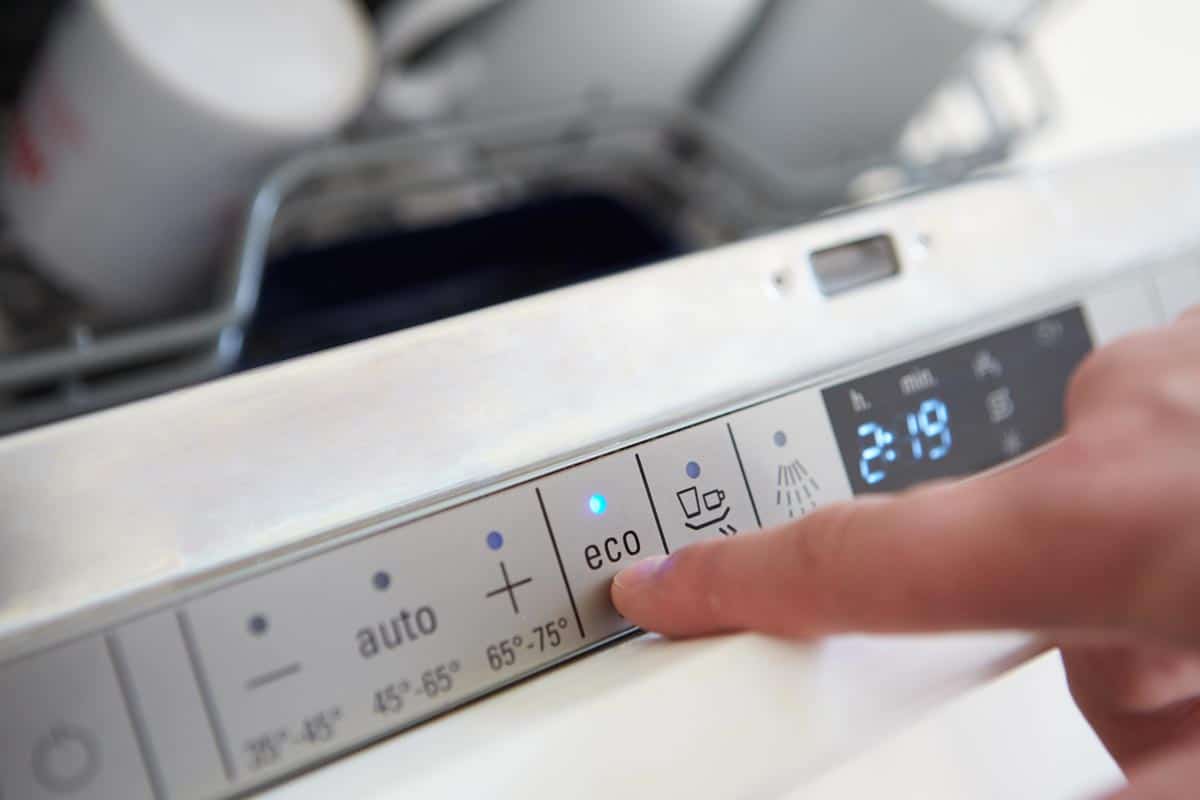

Articles
How Long Does A Dishwasher Run
Modified: January 18, 2024
Discover how long a dishwasher typically runs and get answers to all your questions in this informative articles on dishwasher run time.
(Many of the links in this article redirect to a specific reviewed product. Your purchase of these products through affiliate links helps to generate commission for Storables.com, at no extra cost. Learn more)
Introduction
When it comes to kitchen appliances, a dishwasher is an essential time-saving device. It’s a modern convenience that takes the hassle out of handwashing dishes after a meal. But have you ever wondered how long a dishwasher actually runs for?
The run time of a dishwasher can vary depending on several factors. Understanding these factors can help you better manage your time and energy consumption. In this article, we will explore the different elements that affect dishwasher run time and provide you with some helpful tips to reduce it.
So, let’s dive in and discover how long a dishwasher typically runs!
Key Takeaways:
- Understanding factors like soil level, water temperature, and dishwasher capacity can help manage dishwasher run time effectively, saving time and energy while ensuring sparkling clean dishes.
- Implementing energy-saving tips, proper loading techniques, and selecting the right program can significantly reduce dishwasher run time without compromising cleaning performance, contributing to a greener lifestyle.
Factors Affecting Dishwasher Run Time
Several factors can influence the duration of a dishwasher’s cycle. Understanding these factors will give you insight into why your dishwasher may take longer to complete a cycle than others.
- Soil Level: The level of food particles and grime on your dishes will affect the run time of your dishwasher. If your dishes are heavily soiled, the dishwasher may run for a longer period to ensure thorough cleaning.
- Water Temperature: The temperature of the water used in your dishwasher can impact its run time. Hotter water helps to dissolve detergent efficiently, resulting in quicker cycles. However, if the water temperature is not high enough, the dishwasher may prolong the cycle to ensure proper cleaning.
- Dishwasher Capacity: The size and capacity of your dishwasher can affect the run time. A larger dishwasher may take longer as it can hold more dishes, requiring more time and water to clean them all thoroughly.
- Dishwasher Model: Different dishwasher models have varying performance capabilities, which can affect the cycle time. Some models come equipped with advanced sensors and technology that adjust the cycle duration based on factors such as soil level and water temperature.
These factors, combined with the type of dishwasher program selected, can contribute to the overall run time. Understanding these elements will help you manage your expectations and plan your dishwasher usage accordingly.
Type of Dishwasher Programs
Dishwashers offer a range of programs or cycles to accommodate different types of dishes and cleaning needs. The selection of a specific program can affect the run time of your dishwasher. Here are some common dishwasher programs:
- Normal/Wash: This is the standard program suitable for everyday dishwashing needs. It typically has a moderate run time, offering a balance between efficiency and thorough cleaning.
- Quick Wash: As the name suggests, this program is designed for those times when you need your dishes cleaned quickly. It has a shorter run time but may not provide the same level of deep cleaning as other programs.
- Heavy Duty: This program is ideal for heavily soiled and greasy dishes. It runs for a longer period to ensure thorough cleaning and removing tough stains and grime.
- Auto-Sensing: Many modern dishwashers come equipped with auto-sensing technology that detects the soil level and adjusts the run time accordingly. This program can save time and energy by automatically determining the optimal cleaning duration.
It’s important to choose the right program based on your specific cleaning needs and time constraints. If you have lightly soiled dishes and are looking to reduce the run time, selecting a quick wash or eco-friendly program can be a suitable option.
To save time and energy, run your dishwasher during off-peak hours, such as late at night or early in the morning when electricity demand is lower.
Energy Efficiency and Run Time
Energy efficiency is a crucial factor to consider when it comes to the run time of your dishwasher. By choosing an energy-efficient dishwasher model and following some additional tips, you can minimize both the environmental impact and the duration of the dishwasher cycle. Here are some ways to improve energy efficiency:
- Load the Dishwasher Properly: Ensuring that your dishwasher is loaded efficiently can reduce the run time. Avoid overcrowding the dishwasher, as this can hinder proper water circulation and result in longer cleaning cycles.
- Scrape Dishes Instead of Pre-Rinsing: Pre-rinsing dishes may seem like a good idea, but it can waste water and add unnecessary time to the dishwasher cycle. Instead, scrape off excess food particles before loading the dishes into the dishwasher.
- Use Energy-Saving Features: Many dishwashers have energy-saving features such as eco-mode, which uses less water and energy. By utilizing these features, you can reduce the run time without sacrificing cleaning performance.
- Choose a Low-Temperature Program: Programs that use lower water temperatures can help reduce energy consumption. However, be mindful that certain types of dishes or heavily soiled items may require higher temperatures for effective cleaning.
- Optimize Water Heater Settings: Adjusting your water heater to a lower temperature can reduce the amount of energy used by your dishwasher. Consult your water heater’s manual to find the optimal temperature for both efficiency and proper cleaning.
By implementing these energy-saving tips, you can not only decrease the run time of your dishwasher but also contribute to a greener and more sustainable lifestyle.
Tips to Reduce Dishwasher Run Time
If you’re looking to minimize the run time of your dishwasher and save time and energy, here are some helpful tips to consider:
- Scrape Dishes: Instead of pre-rinsing your dishes, scrape off excess food particles before loading them into the dishwasher. This will help reduce the workload for your dishwasher and shorten the run time.
- Sort Utensils: To optimize the cleaning process, separate utensils and place them in the designated compartments of the dishwasher. This ensures better water circulation and cleaning efficiency, resulting in a shorter run time.
- Avoid Overcrowding: Overloading the dishwasher can impede proper water flow and detergent distribution. Arrange the dishes in a way that allows adequate space for water and detergent to reach all surfaces, leading to faster cleaning.
- Use Proper Detergent: Using the appropriate dishwasher detergent for your specific dishwasher and water hardness can have a significant impact on the cleaning performance. This can result in shorter run times and more effective cleaning.
- Select the Right Program: Choose the dishwasher program that matches your cleaning needs without unnecessary extra features. Selecting a shorter or eco-friendly program can help reduce the overall run time.
- Optimize Water Temperature: Check your dishwasher’s water temperature settings. Lowering the temperature can help save energy and cut down on the cycle time. However, ensure that it’s still hot enough to provide effective cleaning.
- Maintain and Clean the Dishwasher: Regularly clean and maintain your dishwasher to ensure optimal performance. Remove any debris or buildup in filters, spray arms, and nozzles. A well-maintained dishwasher can operate more efficiently and reduce run times.
By implementing these tips, you can significantly reduce the run time of your dishwasher while still achieving sparkling clean dishes.
Conclusion
Understanding the factors that affect dishwasher run time and taking steps to minimize it can help you save time, energy, and water. By considering factors such as soil level, water temperature, dishwasher capacity, and the type of program selected, you can manage your dishwasher usage more effectively. Additionally, focusing on energy efficiency and following tips like properly loading the dishwasher, scraping dishes instead of pre-rinsing, and using energy-saving features can further reduce run times.
Remember, it’s important to strike a balance between efficiency and thorough cleaning. While it’s tempting to choose shorter programs, heavily soiled dishes may require longer cycles to achieve optimal cleanliness.
By following the tips provided in this article, you can reduce the run time of your dishwasher without compromising its performance. Not only will this save you time and energy, but it will also contribute to a more sustainable and eco-friendly lifestyle. So, bid farewell to long dishwasher cycles and embrace a quicker, more efficient way of cleaning your dishes!
Frequently Asked Questions about How Long Does A Dishwasher Run
Was this page helpful?
At Storables.com, we guarantee accurate and reliable information. Our content, validated by Expert Board Contributors, is crafted following stringent Editorial Policies. We're committed to providing you with well-researched, expert-backed insights for all your informational needs.















0 thoughts on “How Long Does A Dishwasher Run”